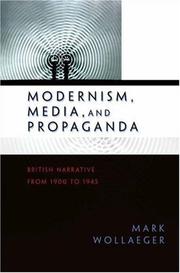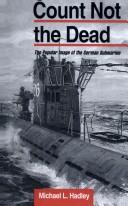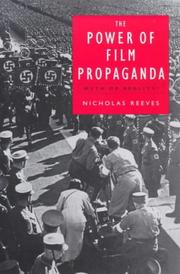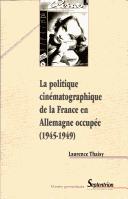| Listing 1 - 10 of 10 |
Sort by
|

ISBN: 9780691128115 9780691138459 0691128111 0691138451 9786612157639 1282157639 1400828627 Year: 2007 Publisher: Princeton, N.J. : Princeton University Press,
Abstract | Keywords | Export | Availability | Bookmark
 Loading...
Loading...Choose an application
- Reference Manager
- EndNote
- RefWorks (Direct export to RefWorks)
Though often defined as having opposite aims, means, and effects, modernism and modern propaganda developed at the same time and influenced each other in surprising ways. The professional propagandist emerged as one kind of information specialist, the modernist writer as another. Britain was particularly important to this double history. By secretly hiring well-known writers and intellectuals to write for the government and by exploiting their control of new global information systems, the British in World War I invented a new template for the manipulation of information that remains with us to this day. Making a persuasive case for the importance of understanding modernism in the context of the history of modern propaganda, Modernism, Media, and Propaganda also helps explain the origins of today's highly propagandized world. Modernism, Media, and Propaganda integrates new archival research with fresh interpretations of British fiction and film to provide a comprehensive cultural history of the relationship between modernism and propaganda in Britain during the first half of the twentieth century. From works by Joseph Conrad to propaganda films by Alfred Hitchcock and Orson Welles, Mark Wollaeger traces the transition from literary to cinematic propaganda while offering compelling close readings of major fiction by Virginia Woolf, Ford Madox Ford, and James Joyce.
English fiction --- Modernism (Literature) --- Motion pictures in propaganda. --- Propaganda --- History and criticism. --- History --- Motion pictures in propaganda --- Moving-pictures in propaganda --- Propaganda in motion pictures --- Communication in politics --- Political psychology --- Social influence --- Advertising --- Persuasion (Psychology) --- Psychological warfare --- Public relations --- Publicity --- Social pressure --- History and criticism

ISBN: 1282857347 9786612857348 0773565264 9780773565265 0773512829 9780773512825 Year: 1995 Publisher: Montreal, Que. McGill-Queen's University Press
Abstract | Keywords | Export | Availability | Bookmark
 Loading...
Loading...Choose an application
- Reference Manager
- EndNote
- RefWorks (Direct export to RefWorks)
Basing his study on some two-hundred-and-fifty German novels, memoirs, fictionalized histories, and films (including Das Boot), Michael Hadley examines the popular image of the German submarine and weighs the values, purposes, and perceptions of German writers and film makers. He considers the idea of the submarine as a war-winning weapon and the exploits of the "band of brothers" who made up the U-boat crews. He also describes the perceptions of the German public about the role of the U-boat in the war effort and the hopes that it carried for victory in two world wars against the Allied forces. Analysed in context, the U-boat emerges as a central factor and metaphor in Germany's ongoing struggle with its political and military past. In Count Not the Dead Hadley explores the complex relationships between political reality and cultural myth, and draws important conclusions about the way in which Germans have interpreted their past and how present concerns change these views.
Submarines (Ships) --- Submarines (Ships) in literature. --- Submarines (Ships) in motion pictures. --- Motion pictures in propaganda --- Propaganda --- Communication in politics --- Political psychology --- Social influence --- Advertising --- Persuasion (Psychology) --- Psychological warfare --- Public relations --- Publicity --- Social pressure --- Moving-pictures in propaganda --- Propaganda in motion pictures --- Motion pictures --- Submarine boats --- Subs (Ships) --- Submersibles --- Warships --- History.
Book
ISBN: 0748653600 1281357669 9786611357665 0748632433 9780748632435 Year: 2022 Publisher: Edinburgh
Abstract | Keywords | Export | Availability | Bookmark
 Loading...
Loading...Choose an application
- Reference Manager
- EndNote
- RefWorks (Direct export to RefWorks)
This book explores how Soviet film worked with time, the past, and memory. It looks at Stalinist cinema and its role in the production of history, the conversion of the present and experience into history, mechanisms of transfer, and what is located between history and the past. The representation of history is always the representation of power. The institution of legitimization and the mechanism for the production of identity, history is the past, constructed and served by the authorities who are attempting to curtail the experience by packaging it into a literary narrative and new visual im
Motion pictures --- Motion pictures and history. --- Motion pictures in propaganda --- Communism and motion pictures --- Communism and moving-pictures --- Motion pictures and communism --- Moving-pictures in propaganda --- Propaganda in motion pictures --- Propaganda --- History and motion pictures --- Moving-pictures and history --- History --- History.

ISBN: 1281784052 9786611784058 082643245X 9780826432452 0826473903 9780826473905 9780826473905 9780826432452 0304338710 0304338729 9780304338726 9780304338719 Year: 2003 Publisher: London New York Continuum :Cassell
Abstract | Keywords | Export | Availability | Bookmark
 Loading...
Loading...Choose an application
- Reference Manager
- EndNote
- RefWorks (Direct export to RefWorks)
Explores five case studies in Britain, the USSR, Germany and Italy to determine whether or not propaganda films reached the audiences at which they were targeted, and where they did, whether the films made the impact on those audiences that the propagandists had expected.
Motion pictures in propaganda --- Politics in motion pictures. --- Motion pictures in propaganda. --- Motion pictures --- Cinema --- Feature films --- Films --- Movies --- Moving-pictures --- Audio-visual materials --- Mass media --- Performing arts --- Moving-pictures in propaganda --- Propaganda in motion pictures --- Propaganda --- History. --- Political aspects. --- History and criticism --- Politics in motion pictures

ISBN: 275742694X 2859399038 9782859399030 Year: 2020 Publisher: Villeneuve d'Ascq : Presses universitaires du Septentrion,
Abstract | Keywords | Export | Availability | Bookmark
 Loading...
Loading...Choose an application
- Reference Manager
- EndNote
- RefWorks (Direct export to RefWorks)
En 1945, après avoir constitué un puissant instrument de propagande sous le Troisième Reich, le cinéma allemand est réduit à néant et se trouve soumis au bon vouloir des puissances d’occupation. Tout en affirmant sa volonté de dénazifier et de rééduquer les Allemands, chacune d’elles entreprend de relancer et de développer les activités cinématographiques d’une façon conforme à ses intérêts. Cette étude se propose de cerner les caractéristiques, l’évolution et le rayonnement de l’action menée par les Français. L’importance qu’ils accordent au cinéma se traduit par de nombreuses mesures : réouverture des salles, installation d’ateliers et de studios, création de sociétés francoallemandes, sélection et diffusion de films français, organisation de galas et de festivals, mise en place de ciné-clubs… Si certaines réalisations s’inscrivent dans une politique de rééducation, d’autres dénotent une volonté de rehausser le prestige de la France et d’implanter le cinéma français en Allemagne. En même temps, des accords passés avec les autres puissances d’occupation témoignent de l’impact du contexte international (émergence de la Guerre Froide et adhésion progressive de la France à la politique anglo-américaine) sur le cinéma.
Motion pictures --- Motion pictures, French --- Motion pictures in propaganda. --- Political aspects. --- History. --- France --- Germany --- Relations --- Moving-pictures in propaganda --- Propaganda in motion pictures --- Propaganda --- French motion pictures --- Foreign films --- Cinema --- Feature films --- Films --- Movies --- Moving-pictures --- Audio-visual materials --- Mass media --- Performing arts --- History and criticism --- politique --- Occupation --- cinéma --- Cinéma --- Cinéma dans la propagande --- Aspect politique --- Histoire --- Allemagne
Book
ISBN: 9780231163927 0231163924 9780231163934 9780231535144 0231535147 Year: 2013 Volume: *12 Publisher: New York Columbia University Press
Abstract | Keywords | Export | Availability | Bookmark
 Loading...
Loading...Choose an application
- Reference Manager
- EndNote
- RefWorks (Direct export to RefWorks)
Between 1933 and 1939, representations of the Nazis and the full meaning of Nazism came slowly to Hollywood, growing more ominous and distinct only as the decade wore on. Recapturing what ordinary Americans saw on the screen during the emerging Nazi threat, Thomas Doherty reclaims forgotten films, such as Hitler's Reign of Terror (1934), a pioneering anti-Nazi docudrama by Cornelius Vanderbilt, Jr.; I Was a Captive of Nazi Germany (1936), a sensational true tale of "a Hollywood girl in Naziland!"; and Professor Mamlock (1938), an anti-Nazi film made by German refugees living in the Soviet Union. Doherty also recounts how the disproportionately Jewish backgrounds of the executives of the studios and the workers on the payroll shaded reactions to what was never simply a business decision. As Europe hurtled toward war, a proxy battle waged in Hollywood over how to conduct business with the Nazis, how to cover Hitler and his victims in the newsreels, and whether to address or ignore Nazism in Hollywood feature films. Should Hollywood lie low, or stand tall and sound the alarm? Doherty's history features a cast of charismatic personalities: Carl Laemmle, the German Jewish founder of Universal Pictures, whose production of All Quiet on the Western Front (1930) enraged the nascent Nazi movement; Georg Gyssling, the Nazi consul in Los Angeles, who read the Hollywood trade press as avidly as any studio mogul; Vittorio Mussolini, son of the fascist dictator and aspiring motion picture impresario; Leni Riefenstahl, the Valkyrie goddess of the Third Reich who came to America to peddle distribution rights for Olympia (1938); screenwriters Donald Ogden Stewart and Dorothy Parker, founders of the Hollywood Anti-Nazi League; and Harry and Jack Warner of Warner Bros., who yoked anti-Nazism to patriotic Americanism and finally broke the embargo against anti-Nazi cinema with Confessions of a Nazi Spy (1939). Review: With a rich blend of art and politics, Doherty brings to light the story of how Hollywood handled Nazism during Hitler's reign. Recommended. Library Journal (starred review) 3/15/13 Hollywood and Hitler, 1933-1939 tracks the advance of fascism, and the movie industry's reaction on screen and in private... [A] fascinating work. -- Kate Muir The Times (London) 4/20/13 A lively study of Hollywood's relationship to Nazism. -- Emily Greenhouse Culture Desk blog, The New Yorker 5/21/13 Wide-ranging and brightly written.The New York Times Book Review -- Dave Kehr The New York Times Book Review 5/26/13 A lively, detailed account and a worthy successor to his books Pre-Code Hollywood: Sex, Immorality, and Insurrection in American Cinema, 1930-1934 and Hollywood's Censor: Joseph I. Breen and the Production Code Administration. -- Philip Kemp Times Higher Education 5/16/13 A remarkable and stimulating account of an important part of movie history and American history. -- Rob Hardy The Dispatch 7/19/13 [Doherty's] books on American cinema from the 1930s to the 1950s are essential reading: Pre-Code Hollywood and Hollywood's Censor: Joseph I. Breen & the Production Code Administration... No one has told this story in as comprehensive or convincing a fashion. As always, Doherty's work is well researched. -- Clayton Koppes Cineaste Fall 2013 A witty writer familiar with Hollywood history and manners, Doherty places the studios' craven behavior within a general account of the political culture of the movies in the thirties and forties.The New Yorker -- David Denby The New Yorker 9/16/13 [A] riveting read. -- Merve Emre The Millions 9/18/13 Mr. Doherty fully understands the studio system and how it juggled interference from its own internal agency, the Production Code Administration. -- Jeanine Basinger Wall Street Journal 9/18/13 Meticulously researched and captivating. -- Noah Isenberg Times Literary Supplement 10/25/13 Doherty masterfully describes how the movie industry, mostly headed by Jews, ultimately came together at a time when the nation needed unity... The book is crisply written, well documented. -- Burton Boxerman St. Louis Jewish Light 11/27/13 Doherty's well researched Hollywood and Hitler 1933-1939 throws fascinating new light on America and the rise of Nazism. -- Philip French The Observer 11/23/13 [A] wide-ranging, scrupulously researched and highly entertaining study. -- Philip French Sight and Sound 8/1/13 [A] judicious and comprehensive history of the period. -- Mark Horowitz Tablet 12/20/13
Nationaal-socialisme en film --- National socialism and motion pictures --- National-socialisme et cinema --- Nazi's in de film --- Nazis dans le cinéma --- Nazis in motion pictures --- National socialism and motion pictures. --- Motion picture industry --- Motion pictures --- Motion pictures in propaganda --- Motion pictures, American --- Motion pictures, German --- Nazis in motion pictures. --- Nazisme et cinéma --- Cinéma --- Cinéma dans la propagande --- Films américains --- Films allemands --- Nazis au cinéma --- History --- Political aspects --- Influence --- Industrie --- Histoire --- Aspect politique --- Nazisme et cinéma --- Cinéma --- Cinéma dans la propagande --- Films américains --- Nazis au cinéma --- United States --- 20th century --- Germany --- Motion pictures [American ] --- Motion pictures [German ] --- Film --- anno 1930-1939 --- Los Angeles [California] --- American motion pictures --- Moving-pictures, American --- Foreign films --- Moving-pictures in propaganda --- Propaganda in motion pictures --- Propaganda --- Cinema --- Feature films --- Films --- Movies --- Moving-pictures --- Audio-visual materials --- Mass media --- Performing arts --- Film industry (Motion pictures) --- Moving-picture industry --- Cultural industries --- Motion pictures and national socialism --- German motion pictures --- History and criticism
Book
ISBN: 9780253018489 025301848X 9780253018434 0253018439 9780253018366 0253018366 0813571359 9780813571355 Year: 2015 Publisher: Bloomington
Abstract | Keywords | Export | Availability | Bookmark
 Loading...
Loading...Choose an application
- Reference Manager
- EndNote
- RefWorks (Direct export to RefWorks)
White Robes, Silver Screens highlights the ways in which the Klan used, produced, and protested against film in order to recruit members, generate publicity, and define its role within American society.
Motion pictures in propaganda --- Motion picture industry --- Moving-pictures in propaganda --- Propaganda in motion pictures --- Propaganda --- Film industry (Motion pictures) --- Moving-picture industry --- Cultural industries --- History --- Political aspects --- Ku Klux Klan (1915- ) --- Ku Klux Klan (19th century) --- Knights of the Ku Klux Klan (1915- ) --- K.K.K. (Ku Klux Klan (1915- )) --- KKK (Ku Klux Klan (1915- )) --- K.K.K.K. (Knights of the Ku Klux Klan (1915- )) --- KKKK (Knights of the Ku Klux Klan (1915- )) --- National Knights of the Ku Klux Klan Association of America --- National Knights of the K.K.K. --- Invisible Empire --- History. --- In motion pictures. --- Birth of a nation (Motion picture : 1915) --- Clansman (Motion picture : 1915) --- Birth of the nation, or, The clansman (Motion picture : 1915) --- Influence. --- Birth of a nation (Motion picture)
Book
ISBN: 0520965345 9780520965348 9780520291683 0520291689 9780520291690 0520291697 Year: 2018 Publisher: Oakland, California
Abstract | Keywords | Export | Availability | Bookmark
 Loading...
Loading...Choose an application
- Reference Manager
- EndNote
- RefWorks (Direct export to RefWorks)
"Cinema and the Wealth of Nations explores how media principally in the form of cinema was used during the interwar years by elite institutions to establish and sustain forms of liberal political economy beneficial to their interests. It examines the media produced and circulated by institutions such as states, corporations, and investment banks, as well as the emergence of a corporate media industry and system supported by state policy and integral to the establishment of a new consumer system. Lee Grieveson sketches a genealogy of the use of media to encode liberal political and economic power across the period that saw the United States eclipse Britain as the globally hegemonic power and the related inauguration of new forms of liberal economic globalization. But this is not a distant history. Cinema and the Wealth of Nations examines a foundational conjuncture in the establishment of media forms and a media system instrumental in, and structural to, the emergence and expansion of a world system that has been--and continues to be--brutally violent, unequal, and destructive."--Provided by publisher.
Capitalism and mass media. --- Motion pictures and globalization. --- Motion pictures in propaganda --- Industrial films --- Motion pictures --- Business films --- Industry-sponsored films --- Motion pictures in business --- Motion pictures in industry --- Moving-pictures in industry --- Documentary films --- Moving-pictures in propaganda --- Propaganda in motion pictures --- Propaganda --- Globalization and motion pictures --- Globalization --- Mass media and capitalism --- Mass media --- Political aspects --- Industrial applications --- Motion pictures and globalization --- Capitalism and mass media --- #SBIB:309H1313 --- #SBIB:309H1331 --- Geschiedenis en/of organisatie van het filmwezen: algemeen en per land (met inbegrip van de rol van het filmwezen in de ontwikkelingsproblematiek) --- Films met een persuasieve functie (met inbegrip van de propaganda- en reclamefilm) --- american cinema. --- american film. --- american movies. --- britain. --- cinema studies. --- cinema. --- consumer. --- corporate media. --- corporate. --- economic power. --- economy. --- elite. --- film and television. --- film studies. --- film. --- globalization. --- interwar. --- liberal. --- mass media. --- media industry. --- nationalism. --- oppression. --- political. --- politics. --- post war. --- propaganda. --- state policy. --- united states. --- violence.
Book
ISBN: 1503610306 1503608840 1503610292 9781503610309 9781503608849 9781503610293 Year: 2019 Publisher: Stanford, California
Abstract | Keywords | Export | Availability | Bookmark
 Loading...
Loading...Choose an application
- Reference Manager
- EndNote
- RefWorks (Direct export to RefWorks)
An inside look at what it means to be pro-regime in Iran, and the debates around the future of the Islamic Republic. More than half of Iran's citizens were not alive at the time of the 1979 Revolution. Now entering its fifth decade in power, the Iranian regime faces the paradox of any successful revolution: how to transmit the commitments of its political project to the next generation. New media ventures supported by the Islamic Republic attempt to win the hearts and minds of younger Iranians. Yet members of this new generation—whether dissidents or fundamentalists—are increasingly skeptical of these efforts. Iran Reframed offers unprecedented access to those who wield power in Iran as they debate and define the future of the Republic. Over ten years, Narges Bajoghli met with men in Iran's Revolutionary Guard, Ansar Hezbollah, and Basij paramilitary organizations to investigate how their media producers developed strategies to court Iranian youth. Readers come to know these men—what the regime means to them and their anxieties about the future of their revolutionary project. Contestation over how to define the regime underlies all their efforts to communicate with the public. This book offers a multilayered story about what it means to be pro-regime in the Islamic Republic, challenging everything we think we know about Iran and revolution.
Motion picture industry --- Motion pictures --- Motion pictures in propaganda --- Moving-pictures in propaganda --- Propaganda in motion pictures --- Propaganda --- Cinema --- Feature films --- Films --- Movies --- Moving-pictures --- Audio-visual materials --- Mass media --- Performing arts --- Film industry (Motion pictures) --- Moving-picture industry --- Cultural industries --- Political aspects --- History and criticism --- Iran --- República Islâmica do Irã --- Irã --- Persia --- Northern Tier --- Islamic Republic of Iran --- Jumhūrī-i Islāmī-i Īrān --- I-lang --- Paras-Iran --- Paras --- Persia-Iran --- I.R.A. --- Islamische Republik Iran --- Islamskai︠a︡ Respublika Iran --- I.R.I. --- IRI --- ايران --- جمهورى اسلامى ايران --- Êran --- Komarî Îslamî Êran --- Cultural policy. --- Politics and government --- Basij. --- Hezbollah. --- Iran. --- Islamic Republic Revolutionary Guards (IRGC). --- Islamic Republic. --- Middle East. --- anthropology. --- ethnography. --- media. --- revolution.
Book
ISBN: 178238698X 9781782386988 9781782386971 1782386971 9781785335136 1785335138 Year: 2015 Publisher: New York Oxford
Abstract | Keywords | Export | Availability | Bookmark
 Loading...
Loading...Choose an application
- Reference Manager
- EndNote
- RefWorks (Direct export to RefWorks)
The beginning of filmmaking in the German colonies coincided with colonialism itself coming to a standstill. Scandals and economic stagnation in the colonies demanded a new and positive image of their value for Germany. By promoting business and establishing a new genre within the fast growing film industry, films of the colonies were welcomed by organizations such as the Deutsche Kolonialgesellschaft (German Colonial Society). The films triggered patriotic feelings but also addressed the audience as travelers, explorers, wildlife protectionists, and participants in unique cultural events. Th
Documentary films --- Motion pictures --- Motion pictures in propaganda --- Moving-pictures in propaganda --- Propaganda in motion pictures --- Propaganda --- Cinema --- Feature films --- Films --- Movies --- Moving-pictures --- Audio-visual materials --- Mass media --- Performing arts --- Documentaries, Motion picture --- Documentary videos --- Factual films --- Motion picture documentaries --- Moving-pictures, Documentary --- Documentary mass media --- Nonfiction films --- Actualities (Motion pictures) --- History --- Colonies. --- History and criticism --- Germany --- Alemania --- Ashkenaz --- BRD --- Bu̇gd Naĭramdakh German Uls --- Bundesrepublik Deutschland --- Deutsches Reich --- Deutschland --- Doitsu --- Doitsu Renpō Kyōwakoku --- Federal Republic of Germany --- Federalʹna Respublika Nimechchyny --- FRN --- German Uls --- Germania --- Germanii︠a︡ --- Germanyah --- Gjermani --- Grossdeutsches Reich --- Jirmānīya --- KhBNGU --- Kholboony Bu̇gd Naĭramdakh German Uls --- Nimechchyna --- Repoblika Federalin'i Alemana --- República de Alemania --- República Federal de Alemania --- Republika Federal Alemmana --- Vācijā --- Veĭmarskai︠a︡ Respublika --- Weimar Republic --- Weimarer Republik --- ХБНГУ --- Германия --- جرمانيا --- ドイツ --- ドイツ連邦共和国 --- ドイツ レンポウ キョウワコク --- Germany (East) --- Germany (Territory under Allied occupation, 1945-1955) --- Germany (Territory under Allied occupation, 1945-1955 : British Zone) --- Germany (Territory under Allied occupation, 1945-1955 : French Zone) --- Germany (Territory under Allied occupation, 1945-1955 : Russian Zone) --- Germany (Territory under Allied occupation, 1945-1955 : U.S. Zone) --- Germany (West) --- Holy Roman Empire --- Colonies --- Films documentaires --- Cinéma --- Cinéma et propagande. --- Histoire --- Allemagne --- Deguo --- 德国 --- Gėrman --- Герман Улс --- Colonies allemandes --- Cinéma et propagande.
| Listing 1 - 10 of 10 |
Sort by
|

 Search
Search Feedback
Feedback About UniCat
About UniCat  Help
Help News
News